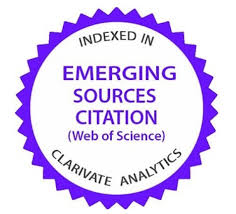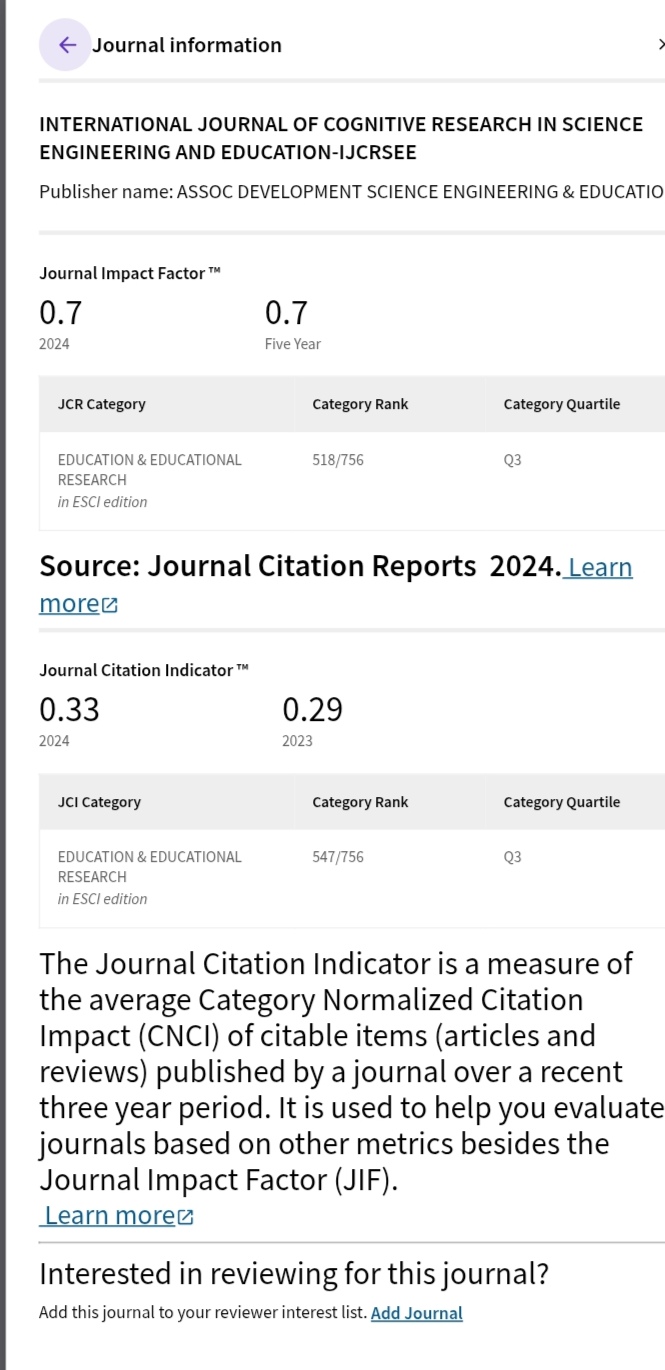Outdoor Education: Perspectives of Teachers and Students in the Context of School in Nature as an Innovative Approach in Education
DOI:
https://doi.org/10.23947/2334-8496-2023-11-3-497-510Keywords:
accounting education students, School in Nature, learning environment, student, teacherAbstract
This research analyzed the opinions of primary school teachers and students regarding the benefits of outdoor education, using the example of School in Nature, for the organization of educational activities within the instruction process. It explored educational, social, recreational, and ecological aspects, as well as the existing differences in their opinions. The research was conducted on a sample of elementary school teachers and fourth-grade students in the Bor District in the Republic of Serbia. The research involved 223 participants (elementary school teachers N=73, and fourth-grade students N=150). A questionnaire was designed for the purposes of this research to assess the opinions of teachers and students towards the learning environment and the effectiveness of implementing outdoor education in the context of School in Nature. The research results indicate a compliance between teachers’ opinions about the significance of outdoor education, especially through School in Nature, and its benefits to the educational aspect of the teaching process. Students displayed positive attitudes related to social interaction in learning, emphasizing the development of positive social relationships and skills. Differences in opinions between teachers and students regarding the learning environment and the effectiveness of outdoor education in meeting learning objectives represent a significant starting point for better understanding the quality of the teaching process.
Downloads
References
Anđelković, A., & Mihajlović, N. (2012). Vanučionička nastava – mogućnost višestrukih promena u nastavi. [Outdoor education - the potential for multiple changes in instruction]. Metodička praksa, 2, 237–250.
Anđić, D., & Mažar, S. (2023). Teachers’ Connectedness to Nature, Education for Sustainable Development and the Contemporary Teaching of the Subject “Nature and Society” in Croatian Schools. Journal of Teacher Education for Sustainability, 25(1), 86-97. https://doi.org/10.2478/jtes-2023-0006 DOI: https://doi.org/10.2478/jtes-2023-0006
Auer, M. R. (2008). Sensory perception, rationalism and outdoor environmental education. International Research in Geographical and Environmental Education, 17(1), 6-12. https://doi.org/10.2167/irgee225.0 DOI: https://doi.org/10.2167/irgee225.0
Begić, A. (2022). A little bit different“ teaching: outdoor teaching as a supplement to classroom teaching. [„Nešto drugačija“ nastava: izvanučionička nastava sa studentima kao nadopuna nastave u učionici] Conference: 3rd International scientific and artistic symposium on pedagogy in the arts. Inovative Methods of Teaching in Arts At: Osijek, Croatia. Retrieved from: https://www.researchgate.net/publication/359468635_A_LITTLE_BIT_DIFFERENT_TEACHING_OUTDOOR_TEACHING_AS_A_SUPPLEMENT_TO_CLASSROOM_TEACHING
Borsos, É., Fekete, A. B., & Boric, E. (2023). Have teachers’ opinions about outdoor education changed after the pandemic?. Journal of Biological Education, 1-15. https://doi.org/10.1080/00219266.2023.2192730 DOI: https://doi.org/10.1080/00219266.2023.2192730
Capaldi, C. A., Dopko, R. L., & Zelenski, J. M. (2014). The relationship between nature connectedness and happiness: A meta-analysis. Frontiers in psychology, 5:976. https://doi.org/10.3389/fpsyg.2014.00976 DOI: https://doi.org/10.3389/fpsyg.2014.00976
Enăchescu, V. A. (2019). Management of educational potential through extracurricular activities. Revista de Management Comparat Internațional, 20(3), 317-322. https://doi.org/10.24818/RMCI.2019.3.317 DOI: https://doi.org/10.24818/RMCI.2019.3.317
Fido, H., & Gayford, C. (1982). Field work and the biology teacher: A survey in secondary schools in Eng-land and Wales. Journal of Biological Education, 16(1), 27-34. https://doi.org/10.1080/00219266.1982.9654414 DOI: https://doi.org/10.1080/00219266.1982.9654414
Fraser, B. J. (2012). Classroom learning environments: Retrospect, context and prospect. Second international handbook of science education, 1191-1239. http://dx.doi.org/10.1007/978-1-4020-9041-7_79 DOI: https://doi.org/10.1007/978-1-4020-9041-7_79
Fraser, B., Fisher, D., & McRobbie, C. (1996). Barry J. Fraser, Darrell L. Fisher, Campbell J. McRobbie. Development, validation, and use of personal and class forms of a new classroom environment instrument. Paper presented at the annual meeting of the American Educational Research Association, New York. Retrieved from: https://www.aare.edu.au/data/publications/2001/fis01028.pdf
İleritürk, D. (2023). Evaluation of extracurricular activities in education according to pre-school teacher candidates’ views. Social Sciences & Humanities Open, 8(1), 100524. https://doi.org/10.1016/j.ssaho.2023.100524 DOI: https://doi.org/10.1016/j.ssaho.2023.100524
Jurčić, M. (2015). Odgoj u izvanučioničkoj nastavi. [Education in Outdoor Classes] U: Odgoj u školi, Opić, S., Bilić, V. i Jurčić, M. (ur.). Zagreb: Učiteljski fakultet Sveučilišta u Zagrebu, 197-221.
Kocayiğit, A., & Ekinci, N. (2020). Ortaöğretim okullarında uygulanan program dışı etkinliklerin öğretmen görüşlerine göre değerlendirilmesi. OPUS International Journal of Society Researches, 16(29), 1810-1848. https://doi.org/10.26466/opus.749109 DOI: https://doi.org/10.26466/opus.749109
Kuo, M., Browning, M., & Penner, M. (2018). Do lessons in nature boost subsequent classroom engagement? Refueling students in flight. Frontiers in psychology, 8, 2253. https://doi.org/10.3389/fpsyg.2017.02253 DOI: https://doi.org/10.3389/fpsyg.2017.02253
Manni, A., Ottander, C., Sporre, K., & Parchmann, I. (2013). Perceived learning experiences regarding edu-cation for sustainable development–within Swedish outdoor education traditions. Nordic Studies in Science Education, 9(2), 187-205. https://doi.org/10.5617/nordina.653 DOI: https://doi.org/10.5617/nordina.653
Milosavljević Đukić, T., Bogavac, D., & Stojadinović, A. (2022). The role of extracurricular activities in improving the educational function of primary school, TEACHER - International Journal of Education, 23. (pp. 22 – 37). University “St. Kliment Ohridski“, Bitola. eISSN: 1857-8888 Retrieved from: https://www.ijeteacher.com/index.php/ijet/issue/view/9/21
Mitić, LJ., Dejković, M., & Zlatanović Marković V. (2022). Vanučionička nastava prirode i društva [Outdoor Education in Nature and Society Classes]. Teaching Innovations/Inovacije u Nastavi, 35(4). https://doi.org/10.5937/inovacije2204125M DOI: https://doi.org/10.5937/inovacije2204125M
Orion, N., & Hofstein, A. (1994). Factors that influence learning during a scientific field trip in a natural environment. Journal of research in science teaching, 31(10), 1097-1119. https://doi.org/10.1002/tea.3660311005 DOI: https://doi.org/10.1002/tea.3660311005
Pace, S., & Tesi, R. (2004). Adult’s Perception of Field Trips Taken within Grades K-12: Eight Case Studies in the New York Metropolitan Area. Education, 125(1), 30-40. Retrieved from: https://eric.ed.gov/?id=EJ698680
Radivojević, D., & Jelić, M. (2016). Izvanučionička nastava u nastavi prirode i društva. Nova škola, 11(1), 235-250. https://doi.org/10.7251/NS1601237R DOI: https://doi.org/10.7251/NS1601237R
Rickinson, M., Dillon, J., Teamey, K., Morris, M., Choi, M., Y., Sanders, D., & Benefield, P. (2004). A review of Research on Outdoor Learning. National Foundation for Educational Research and King’s College London. Retrieved from: https://www.field-studies-council. org/media/268859/2004_a_review _of_research_on_outdoor_ learning.pdf
Ristić, M. R., & Blagdanić, S. R. (2017). Nove perspektive u obrazovanju-vanučionička nastava u digitalnom okruženju [New Perspectives in Education - Outdoor Education in a Digital Environment]. Inovacije u nastavi-časopis za savremenu nastavu, 30(2), 1-14. https://doi.org/10.5937/inovacije1702001R DOI: https://doi.org/10.5937/inovacije1702001R
Yli-Panula, E., Jeronen, E., & Lemmetty, P. (2019). Teaching and learning methods in geography promoting sustainability. Education Sciences, 10(1), 5. https://doi.org/10.3390/educsci10010005 DOI: https://doi.org/10.3390/educsci10010005
Published
How to Cite
Issue
Section
Categories
License
Copyright (c) 2023 Tatjana Milosavljević Đukić, Aleksandar M. Stojadinović, Ana D. Spasić Stošić, Dragan S. Cenić

This work is licensed under a Creative Commons Attribution 4.0 International License.
Plaudit
Accepted 2023-12-10
Published 2023-12-20











